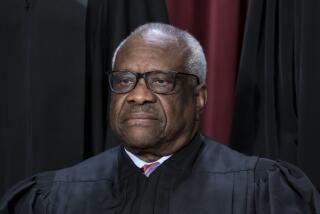Anita Hill Writer Says Judge Leaked FBI Files
- Share via
WASHINGTON — David Brock, the formerly conservative writer turned scourge of the conservative movement, said Friday that a protege of Sen. Strom Thurmond (R-S.C.) who has been nominated as a U.S. district judge gave him confidential FBI files nearly 10 years ago for his book on the Clarence Thomas .versus Anita Faye Hill controversy.
Brock filed a sworn statement with the Senate Judiciary Committee late Friday.
On Monday, the panel is scheduled to hold a confirmation hearing for Judge Terry L. Wooten, now a federal magistrate in Florence, S.C. His nomination by President Bush was not controversial.
But Brock’s charge threatens to reopen a bruising episode for the committee. In 1991, Wooten was the committee’s chief Republican counsel, and he helped coordinate the defense of Clarence Thomas’ nomination to the Supreme Court.
In September of that year, when Hill sent the committee a statement accusing her former boss of having harassed her with crude sexual comments, Wooten chose to withhold the information from the Republican senators. They were then surprised--and in some instances, furious--when the accusations were revealed on the eve of a Senate vote for Thomas.
Wooten said in later published accounts that his withholding of Hill’s statement was “an effort to control the damage.”
But, of course, the Thomas confirmation hearings played out as a national TV drama, and the hard feelings remained after Thomas won a narrow confirmation.
In October 1991, Brock said he was commissioned to write a book to discredit Hill and Angela Wright, who also accused Thomas of making crude comments.
Brock now has said that White House aides sent him to Wooten to obtain FBI files that contained derogatory comments about Wright.
“Mr. Wooten handed me copies of several pages of Ms. Wright’s raw FBI files,” Brock said in his sworn statement. “This material included FBI interviews of Ms. Wright’s former employers and former co-workers. With Mr. Wooten’s agreement, I removed the FBI material from his office.”
The FBI material appeared in a March 1992 article in the American Spectator, a conservative magazine funded by reclusive billionaire Richard Mellon Scaife. Brock’s book, “The Real Anita Hill,” was published a year later.
At several points in the book, Brock quotes from “an FBI file” that referred to Wright as “vengeful, angry and immature.”
“There’s no way I could have gotten this if Wooten hadn’t given me the files,” Brock said Friday.
Wooten did not return calls to his office Friday, but in conversations with two senior administration officials, he denied Brock’s charge. The officials said Wooten conceded that he met with Brock to discuss his book but insisted he did not give him FBI files. Wooten said he had not even seen or known of an FBI file on Wright, according to the officials, who spoke only on condition on anonymity.
“Based on all of our information and investigation, there is absolutely no basis for any allegation that Judge Wooten provided Brock with FBI materials related to Ms. Wright,” said Mindy Tucker, a Justice Department spokeswoman.
“I think it would be unfortunate if the desire for book sales promulgated a charge involving a man’s integrity, such as this might,” she said of Brock’s sworn statement.
Brock had a falling out with conservatives in 1996 after his book on then-First Lady Hillary Rodham Clinton turned out to be more laudatory than critical.
More recently, Brock has disavowed most of his earlier work, including the book on Hill. “I was a witting cog in the Republican sleaze machine,” he wrote in the August issue of Talk magazine.
This fall, he is set to publish “Blinded by the Right,” a book that he says will set the record straight by telling the truth about his past dealings.
Some former friends say that since Brock has admitted publishing dubious stories in the past, he cannot be trusted now. But because of his earlier access to conservative inner circles, he could pose a danger for some nominees.
In May, the Judiciary Committee postponed a vote on Theodore B. Olson, Bush’s nominee to be U.S. solicitor general, because Brock alleged Olson was involved in the “Arkansas Project,” a Scaife-funded effort to dig up dirt on former President Clinton.
In the end, the committee could not resolve the issue, and Olson won a narrow Senate approval.
More to Read
Get the L.A. Times Politics newsletter
Deeply reported insights into legislation, politics and policy from Sacramento, Washington and beyond. In your inbox twice per week.
You may occasionally receive promotional content from the Los Angeles Times.










